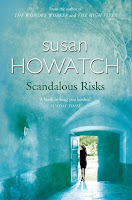 |
| (Amazon UK link) |
This novel continues the story of Neville Aysgarth, now Dean of Starbridge Cathedral. However it’s told through the eyes of Venetia Flaxton, a girl whom, in the previous novel, very much admired Aysgarth when she was a child of nine. The novel opens in the 1980s, when Venetia takes a wrong turning and finds herself in Starbridge, somewhere she had determined never to see again. She meets her ‘talisman’... and then the majority of the book is a lengthy flashback to 1963, when Venetia was in her late twenties.
Venetia is an interesting person, youngest in a long family, not convinced that her father cares for her at all. She’s highly intelligent but fought against going to Oxford, and indeed almost anything her parents suggested. But, deciding she must leave their orbit for a while, she goes to stay with her friend Primrose Aysgarth (daughter of the Dean) for a few days in Starbridge. There she meets the upright and theologically conservative Bishop, Charles Ashworth (who was the main protagonist in the first Starbridge book, ‘Glittering Images’) and his wife Lyle. She also becomes re-acquainted with the Dean, and realises that even though he’s twenty-five or more years older than she is, her feelings for him are much stronger than that of admiration or friendship…
In theory the book stands alone, but with so many people from previous books, a great deal would be missed if this was read without the benefit of knowing Charles and Lyle’s story from the first book, as well as that of Neville and his unlikely wife Dido. The writing, as with all Howatch’s novels, is excellent. The style is terse, without irrelevant details, and the conversations feel realistic. The depth of character is superb; Venetia is naive and yet knowledgeable, insecure and, in other ways, confident. Neville is still, in my view, a rather disagreeable and manipulative person, and somehow this is conveyed through Venetia’s words, even though she herself adores him.
The storyline, however, becomes more and more unpleasant, raunchy in its implications, although the author wisely keeps the smutty scenes to a minimum, and undescribed other than in passing. The focus of the plot keeps returning to the book ‘Honest to God’ by John Robinson, which in theological circles in the 1960s was apparently quite controversial. It attacked traditional views of God, and proposed a very different kind of morality. Bishop Charles spends much of the book dictating his refutation of the book, while Neville tries to convince himself and Venetia that it portrays reality.
There are psychological twists and turns, as ever in this author’s books, and some fascinating - and, at times, very disturbing - insights into the hierarchy and practice of the Church of England in the 1960s. I think I’m glad I read it again, as I plan to keep going with the series. At times, particularly towards the end, it was almost impossible to put down. I’d remembered the main storyline, but forgotten most of the details and the outcome. Yet I didn’t really enjoy it, and was pleased to get to the end.
Worth reading if you're a fan of the author, and reading the Starbridge books in sequence.
Review copyright 2017 Sue's Book Reviews
No comments:
Post a Comment